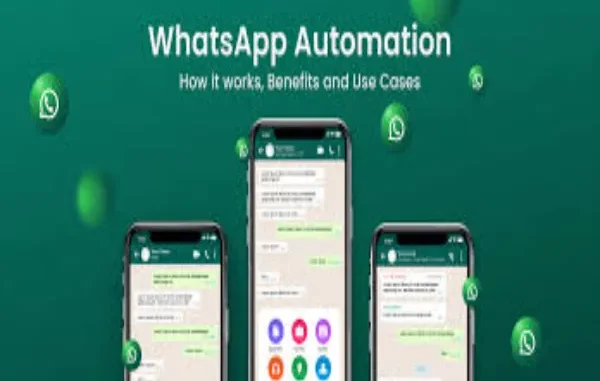

Imagine a sales process with no leaks. Every person who shows interest gets an immediate, friendly hello. An abandoned cart isn’t a dead end, but the start of a helpful conversation. This is what modern businesses are building right now.
For most businesses, though, reality is different. Today’s customers expect immediate answers. Waiting for an email reply creates a gap where you lose attention, trust, and sales.
This is where WhatsApp automation for business offers a solution, acting as the core of “conversational commerce”—a more human approach to sales. This guide explores how to use it to build relationships that drive sales, not just complete transactions.
Building a sales engine that never sleeps
The biggest shift is seeing automation as more than robotic auto-replies. It’s about creating a smart, guided experience that feels personal.
You’re building a system that works around the clock, ensuring no opportunity is missed. This system becomes your best salesperson, always ready.
Turning the first “hello” into a sale, 24/7
The first interaction is critical. It sets the tone for the relationship. Long waits cause leads to lose excitement and find a competitor. Automation provides instant engagement, solving this problem.
Think about placing a QR code on your packaging or ads. A customer scans it, and a WhatsApp chat opens. An automated message immediately welcomes them with a simple question, like, “Hi! Are you looking for running shoes or hiking boots today?” This solves the slow response problem, capturing interest at its peak.
You can also let customers shop directly in the chat. With interactive menus, you guide people through your catalog without them leaving the app. A customer can ask for a product, see your top models, get answers to common questions, and even check stock in real-time. It’s a seamless experience that feels like having a personal shopper.
This is also a great way to build a contact list for future communications. With a proper strategy, you can broadcast whatsapp messages with news and offers to an audience that has already shown interest, turning a single query into a long-term channel.
Finally, automation makes buying easy. The system sends a direct link to a pre-filled cart, removing the steps of navigating a website and re-entering info. This removes friction and makes it much easier to turn an interested browser into a buyer.
Winning back those abandoned carts while you sleep
Abandoned carts are a huge source of lost revenue. WhatsApp automation offers a personal way to re-engage these customers and recover sales more effectively than email.
Picture this: a customer leaves your site without buying. An hour later, they get a gentle message: “Hi [Name], I noticed you left a few things in your cart. Can I help with any questions?” This is a helpful gesture that opens a conversation and resolves last-minute doubts.
If they still don’t buy, the system can follow up a day later with a small offer, like free shipping or a 10% discount. It’s a direct, personal message that’s harder to ignore than a generic email.
Even more valuable is the opportunity to learn. What if the automation asked, “Just curious, was there a reason you didn’t complete your purchase?” The answers are gold. They give you direct insight into problems with your checkout, pricing, or product info, helping you make real improvements.
Creating real connections, with every single customer
Many fear automation feels impersonal, but the opposite is often true. By connecting to your data, it enables personal touches at a scale humans can’t manage. It’s about using tech to make customers feel seen.
Using what you already know to have better conversations
The real power is unlocked when you connect automation to your customer data from a CRM or e-commerce store. This gives the system context to turn generic messages into relevant conversations that build loyalty.
Imagine sending a message a week after delivery. Instead of a generic “How was your order?” it could say, “Hi [Name], how are you enjoying the new coffee machine? Here’s a quick video on how to make the perfect espresso.”
This simple follow-up shows you care. You can even add, “P.S. We just got a new blend of beans that people are loving with that machine” to naturally introduce a cross-sell.
This approach also lets you treat your best customers like VIPs. Your system can identify repeat buyers and give them a personal heads-up on new products before anyone else. This exclusive treatment costs nothing but creates immense loyalty.
What’s next? chats that actually know what customers want
AI is taking automation to the next level, and many competitors aren’t here yet. Soon, systems will anticipate needs, not just respond to requests. This turns sales into a predictive, helpful service.
AI can now read the mood of a conversation. It detects if a customer is happy, confused, or frustrated. If it senses frustration, the chat can be flagged for a human to step in. This ensures customers get the right help when they need it.
The real potential is in predictive selling. Imagine a system that analyzes purchase history and sends proactive, relevant suggestions. A message like, “Hey [Name], since you love our hiking boots, we thought you’d like our new waterproof jacket” feels like a recommendation from a friend. It’s a shift from reacting to anticipating needs.
Your first conversation is the future of your business
The future of sales lies in building helpful, personal relationships instead of just pushing products. This approach captures more leads, rescues lost sales, and builds a loyal customer base. WhatsApp automation for business is the ideal platform to make this happen.
You don’t need to automate everything at once. Start small. Pick one moment in your customer’s journey, like the first hello or an abandoned cart. Think about how one automated conversation could improve it. That’s the first step.






Leave a Reply